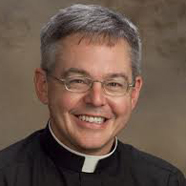We will be saved and have ‘fullness of life’

By: By Msgr. Stuart Swetland
First Sunday of Lent, Feb. 17
Deuteronomy 26:4-10; Psalm 91:1-2,10-11,12-13,14-15; Romans 10:8-13; Luke 4:1-13
It is well known that in Hebrew, the name Jesus means “God saves” (cf. Catechism of the Catholic Church 430.) But what does it mean to be saved?
The readings for this First Sunday in Lent lead me to ponder this ancient theological question. In the Gospel, Jesus is filled by the Holy Spirit and led into the desert to fast and pray. Although tempted by the “Father of Lies,” the devil, to seek pleasure or power or pride, Jesus resists because of His intimate knowledge of the love of the Father and His covenant with Israel.
In the first reading, the Chosen People are rescued by God’s strong arm and brought out of bondage into a land flowing with milk and honey. The Psalm speaks of God as a refuge and a fortress who will deliver us from evil. The second reading promises that “everyone who calls on the name of the Lord will be saved.”
My reflection on the question of salvation led me to the prodigious works of the well-known Scripture scholar and theologian Father William Most. Father Most, a priest of the Diocese of Dubuque and longtime professor at Loras College, died in 1998. However, through the efforts of several devoted lay persons, more than 230 of Father Most’s works are now available online.
He reminds us that there are three meanings (or “senses”) of the word “saved” in Sacred Scripture: (1) rescued from evils in this life; (2) final entry into heaven and (3) entry into the Church (“Saved In Scripture,” the Father Most Collection on CatholicCulture.org)
WE BELONG
Two of the meanings seem straightforward: “to be saved” is a temporary rescue from evils here and now or final salvation in heaven. These seem straightforward enough. When the disciples are in peril on the sea they cry to the Lord to save them and He calms the storm (cf Mathew 8:23-27). Here Jesus rescues them from the evils threatened by the “furious storm.” The Chosen People were saved from the oppression of slavery in the Exodus event described in today’s first reading.
Scripture also speaks of salvation in terms of our final victory in heaven. For example, St. Paul speaks of our being saved even after our work is tested by fire in 1 Corinthians 3:10-15. Here Paul is referring to one’s final salvation (often this passage in invoked in reference to purgatory.)
But the most common usage of the word “saved” in Scripture is “entry into the Church.” To be saved means to belong to the messianic people of God. The Church is that community of people in friendship with God. It is the kingdom in seed or embryo growing sometimes imperceptibly in our midst. As the Catechism teaches: “It is the Church that believes first, and so bears, nourishes and sustains my faith” (CCC 168.)
MODEL FOR LIVING, LOVING
As we begin Lent we are reminded that this is the season when we prepare to renew our own baptismal vows (to celebrate again our own entry into the Church) and to welcome new members into the Church. It is a season of great joy and rebirth.
In other words, Lent challenges us to renew and deepen our faith. We assent — individually and communally — to the faith of the Church (we “confess with our lips that Jesus is Lord”) and we entrust ourselves in a personal and communal commitment of intimate relationship with the Living Lord (we “believe in our hearts that God raised Him from the dead.”) By both assenting and entrusting we fulfill the requirements of the obedience of faith as the Second Vatican Council taught: “By faith man freely commits his entire self to God, making ‘the full submission of his intellect and will to God who reveals’ and willingly assents to the Revelation given by Him” (“Dei Verbum,” 5.)
By faith we make a total gift of ourselves in intimate, personal, passionate relationship with God and we believe (and live) His word in our daily lives.
In Jesus, God saves His people by making an intimate relationship with Him possible and by revealing to us how we are to live and love. Thus Jesus saves by making life in His community of friends, the Church, possible. To live in communion with the Church is to begin to experience the fullness of life which culminates in eternal life with God in heaven.
—–
Msgr. Stuart Swetland, a priest of the Diocese of Peoria, is the Most Rev. Harry J. Flynn Professor of Christian Ethics at Mount St. Mary University in Emmitsburg, Md., and director of the Center for the Advancement of Catholic Higher Education.





